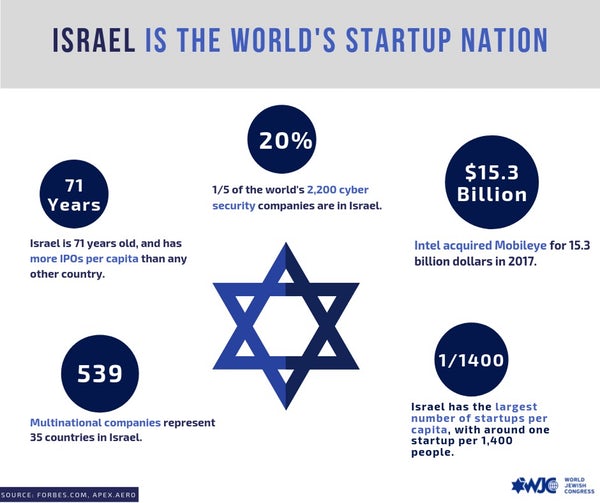Considering the limited availability of resources, Israel is on a perpetual pursuit to search for new sources of earning and has succeeded in monetizing the field of research and development in science and technology.
Faced with existential threat due to the paucity of resources and being surrounded on all sides by enemy nations, research and development was essential for Israel to maximum production and for its armed forces to maintain an edge over the enemy. However, when they realized that R&D could also turn a revenue earner for them, Israel put in added efforts into the area.
However, due to the small size of its land and population, the domestic market for Israeli inventions was to be restricted naturally. It made the Israeli researchers, entrepreneurs and the government as well to think more about international markets or exporting their research. Of course, for the Israeli inventions to survive the global competition, they had to be novel and out of the box. Novelty has been the focal point in the journey of the Israeli research and development in the fields of science and technology….and this is where the importance of the ‘startups’ is realized.
Today’s Israeli culture has, in fact, become a ‘startup’ culture. It is extremely easy to begin a startup in Israel. First and foremost, Israel is called a ‘startup nation’. The Israeli city of Tel Aviv comes second only to Silicon Valley in terms of being a ‘startup city’. Furthermore, Israel ranks first among all nations in the ‘per capita’ startups.
Every year, Israel sees the birth of more than one thousand startups. There are scores of families in Israel which have at least one ‘entrepreneur’ among them who thinks out of the box and plans to shape his ideas into startup.

Government programs like industrial parks, technology incubators, etc. provide for the capital and all the needs of a startup which satisfies the criteria laid down by the government.
However, those startups which fail to satisfy the conditions, approach private investors. Many times, initial investors in a startup are none other than parents, family members, relatives, etc. who lend capital to a venture. However, gradually, as the needs of a startup increases, the household sources do not prove sufficient every time.
It is the time when private investors are keen to put in their capital into the startups. They are referred to as ‘Angel investors’ or ‘Venture capitalists’. Only after a detailed study and analysis, a startup which is thought to provide maximum ‘return on investment’ is infused with capital.
Generally, an ‘Angel investor’ is an individual who is investing his own money into a startup. As a result, their investing power is limited. They put money into a startup when it is very young.
On the other hand, a ‘Venture capitalist’ is generally a company which invests the money which people have invested in them. Hence, their standards are stricter as compared to angel investors. Besides, with the public funds, their investing power is more than the angel investors. The venture capitalists generally select a startup which has achieved a certain level of stability and exhibits growth potential.
Of course, not all startups succeed. Several startups end up unsuccessful and shut their shop due to flawed policies or with the concept on which they are based failing to ‘click’ or because of competition. More than five thousand startups are believed to be functional in Israel today.
However, the startups born from viable concepts and where policies are shaped correctly end up being successful. A startup is considered successful when it ceases to be one, that is when it gets ‘acquired’ by a large corporate entering into its sector or from within its sector. The process is referred to as ‘exit’ and ‘exiting’ in such a manner is considered to be the progress for a startup. Such ‘exits’ face criticism as the rigorous efforts which the Israeli researchers put in to develop their concepts finally end up being purchased by the foreign companies. However, this is exactly what the investors, who put their money into the startups, expect from it as its the ‘exit’ which gives them maximum return on investment.
In Israel, not only the ‘angel investing’ or ‘venture capital investment’ but also the ‘exit system’, that is, the process of ‘takeover’ of known and stable startups is developed quite well. Today, the transactions under the ‘exit system’ run into billions of dollars. The scale is enough for one to understand its magnitude. The largest and the most talked-about of the ‘exits’ was the one by Prof. Amnon Shashua. In 1999, Prof. Shashua began his startup ‘Mobileye’, where he developed the ‘Advanced Driver Assistance System’. In 2017, Intel bought Mobileye for $15.3 billion. Intel has acquired more than 30 Israeli startups in about a last decade. Many other foreign firms are also acquiring Israeli companies at high costs.

For example – ICQ (an instant messaging platform) was purchased by AOL for $287 million, Mercury (B2B IT solutions provider) was bought by HP for $4.5 billion, Playtika (a mobile gaming company) was acquired by a consortium of Chinese companies for $4.4 billion, M-Systems (producer of USB flash drives) was taken over by Sandisk for $1.5 billion.
In a way, the Israel Defense Forces or the IDF play an important role in the startups. In Israel, three years of military training and service is compulsory for all Jewish students and citizens. The ‘genius’ trainees are identified from within them. In addition to general military training, they are given specialized training into anti-hacking skills, cybersecurity, etc. which helps them not only during their conscription but also in their individual life. The training helps make friends with like-minded colleagues who later join hands to form a startup. There are many such examples, most in the cybersecurity sector. An engineer working on the ‘guided missile technology’ in a firm affiliated to the IDF developed the ‘Pill camera’. The find happened while working on a task to fit a camera on missiles. It is known that later he launched it commercially through his own startup.
This is about Israel, a ‘startup nation’! Israel never faced a dearth of novel concepts as they correctly recognized their potential at research and development in the fields of science and technology and shaped their policies accordingly. Thus, irrespective of the number of startups that ‘exit’, Israel has continued to see the birth and growth of startups which come with novel concepts and there is no doubt that this trend will continue in a similar manner. (To be continued…)
















